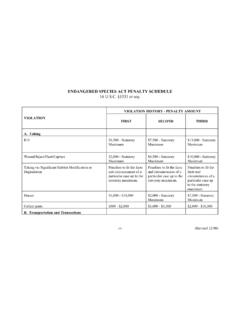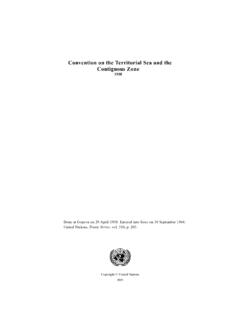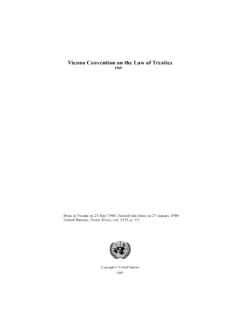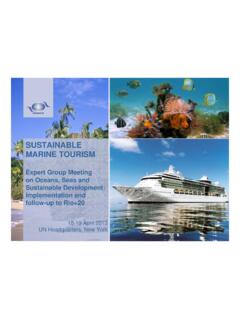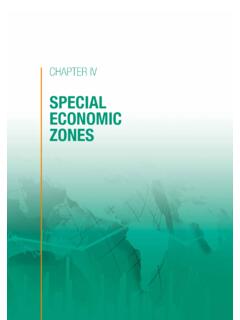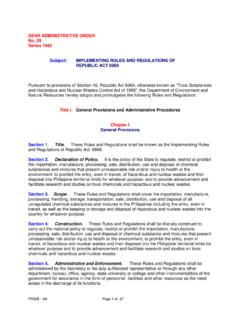Transcription of Convention on the High Seas - National Oceanic and ...
1 Convention on the high seas 1958. Done at Geneva on 29 April 1958. Entered into force on 30 September 1962. United Nations, Treaty Series, vol. 450, p. 11, p. 82. Copyright United Nations 2005. Convention on the high seas Done at Geneva on 29 April 1958. The States Parties to this Convention , Desiring to codify the rules of international law relating to the high seas , Recognizing that the United Nations Conference on the Law of the Sea, held at Geneva from 24 February to 27 April 1958, adopted the following provisions as generally declaratory of established principles of international law, Have agreed as follows: Article 1. The term high seas means all parts of the sea that are not included in the territorial sea or in the internal waters of a State. Article 2. The high seas being open to all nations, no State may validly purport to subject any part of them to its sovereignty. Freedom of the high seas is exercised under the conditions laid down by these articles and by the other rules of international law.
2 It comprises, inter alia, both for coastal and non-coastal States: (1) Freedom of navigation;. (2) Freedom of fishing;. (3) Freedom to lay submarine cables and pipelines;. (4) Freedom to fly over the high seas . These freedoms, and others which are recognized by the general principles of international law, shall be exercised by all States with reasonable regard to the interests of other States in their exercise of the freedom of the high seas . Article 3. 1. In order to enjoy the freedom of the seas on equal terms with coastal States, States having no sea coast should have free access to the sea. To this end States situated between the sea and a State having no sea coast shall by common agreement with the latter, and in conformity with existing international conventions, accord: (a) To the State having no sea coast, on a basis of reciprocity, free transit through their territory; and (b) To ships flying the flag of that State treatment equal to that accorded to their own ships, or to the ships of any other States, as regards access to seaports and the use of such ports.
3 2. 2. States situated between the sea and a State having no sea coast shall settle, by mutual agreement with the latter, and taking into account the rights of the coastal State or State of transit and the special conditions of the State having no sea coast, all matters relating to freedom of transit and equal treatment in ports, in case such States are not already parties to existing international conventions. Article 4. Every State, whether coastal or not, has the right to sail ships under its flag on the high seas . Article 5. 1. Each State shall fix the conditions for the grant of its nationality to ships, for the registration of ships in its territory, and for the right to fly its flag. Ships have the nationality of the State whose flag they are entitled to fly. There must exist a genuine link between the State and the ship; in particular, the State must effectively exercise its jurisdiction and control in administrative, technical and social matters over ships flying its flag.
4 2. Each State shall issue to ships to which it has granted the right to fly its flag documents to that effect. Article 6. 1. Ships shall sail under the flag of one State only and, save in exceptional cases expressly provided for in international treaties or in these articles, shall be subject to its exclusive jurisdiction on the high seas . A ship may not change its flag during a voyage or while in a port of call, save in the case of a real transfer of ownership or change of registry. 2. A ship which sails under the flags of two or more States, using them according to convenience, may not claim any of the nationalities in question with respect to any other State, and may be assimilated to a ship without nationality. Article 7. The provisions of the preceding articles do not prejudice the question of ships employed on the official service of an intergovernmental organization flying the flag of the organization.
5 Article 8. 1. Warships on the high seas have complete immunity from the jurisdiction of any State other than the flag State. 2. For the purposes of these articles, the term warship means a ship belonging to the naval forces of a State and bearing the external marks distinguishing warships of its nationality, under the command of an officer duly commissioned by the government and whose name appears in the Navy List, and manned by a crew who are under regular naval discipline. 3. Article 9. Ships owned or operated by a State and used only on government non-commercial service shall, on the high seas , have complete immunity from the jurisdiction of any State other than the flag State. Article 10. 1. Every State shall take such measures for ships under its flag as are necessary to ensure safety at sea with regard, inter alia, to: (a) The use of signals, the maintenance of communications and the prevention of collisions.
6 (b) The manning of ships and labour conditions for crews taking into account the applicable international labour instruments;. (c) The construction, equipment and seaworthiness of ships. 2. In taking such measures each State is required to conform to generally accepted international standards and to take any steps which may be necessary to ensure their observance. Article 11. 1. In the event of a collision or of any other incident of navigation concerning a ship on the high seas , involving the penal or disciplinary responsibility of the master or of any other person in the service of the ship, no penal or disciplinary proceedings may be instituted against such persons except before the judicial or administrative authorities either of the flag State or of the State of which such person is a National . 2. In disciplinary matters, the State which has issued a master's certificate or a certificate of competence or licence shall alone be competent, after due legal process, to pronounce the withdrawal of such certificates, even if the holder is not a National of the State which issued them.
7 3. No arrest or detention of the ship, even as a measure of investigation, shall be ordered by any authorities other than those of the flag State. Article 12. 1. Every State shall require the master of a ship sailing under its flag, insofar as he can do so without serious danger to the ship, the crew or the passengers: (a) To render assistance to any person found at sea in danger of being lost;. (b) To proceed with all possible speed to the rescue of persons in distress if informed of their need of assistance, insofar as such action may reasonably be expected of him;. 4. (c) After a collision, to render assistance to the other ship, her crew and her passengers and, where possible, to inform the other ship of the name of his own ship, her port of registry and the nearest port at which she will call. 2. Every coastal State shall promote the establishment and maintenance of an adequate and effective search and rescue service regarding safety on and over the sea and where circumstances so require by way of mutual regional arrangements cooperate with neighbouring States for this purpose.
8 Article 13. Every State shall adopt effective measures to prevent and punish the transport of slaves in ships authorized to fly its flag, and to prevent the unlawful use of its flag for that purpose. Any slave taking refuge on board any ship, whatever its flag, shall ipso facto be free. Article 14. All States shall cooperate to the fullest possible extent in the repression of piracy on the high seas or in any other place outside the jurisdiction of any State. Article 15. Piracy consists of any of the following acts: (1) Any illegal acts of violence, detention or any act of depredation, committed for private ends by the crew or the passengers of a private ship or a private aircraft, and directed: (a) On the high seas , against another ship or aircraft, or against persons or property on board such ship or aircraft;. (b) Against a ship, aircraft, persons or property in a place outside the jurisdiction of any State.
9 (2) Any act of voluntary participation in the operation of a ship or of an aircraft with knowledge of facts making it a pirate ship or aircraft;. (3) Any act of inciting or of intentionally facilitating an act described in subparagraph 1 or subparagraph 2 of this article. Article 16. The acts of piracy, as defined in article 15, committed by a warship, government ship or government aircraft whose crew has mutinied and taken control of the ship or aircraft are assimilated to acts committed by a private ship. 5. Article 17. A ship or aircraft is considered a pirate ship or aircraft if it is intended by the persons in dominant control to be used for the purpose of committing one of the acts referred to in article 15. The same applies if the ship or aircraft has been used to commit any such act, so long as it remains under the control of the persons guilty of that act. Article 18. A ship or aircraft may retain its nationality although it has become a pirate ship or aircraft.
10 The retention or loss of nationality is determined by the law of the State from which such nationality was derived. Article 19. On the high seas , or in any other place outside the jurisdiction of any State, every State may seize a pirate ship or aircraft, or a ship taken by piracy and under the control of pirates, and arrest the persons and seize the property on board. The courts of the State which carried out the seizure may decide upon the penalties to be imposed, and may also determine the action to be taken with regard to the ships, aircraft or property, subject to the rights of third parties acting in good faith. Article 20. Where the seizure of a ship or aircraft on suspicion of piracy has been effected without adequate grounds, the State making the seizure shall be liable to the State the nationality of which is possessed by the ship or aircraft, for any loss or damage caused by the seizure.

